Introduction: The Role of Employment in Recovery
Employment serves as a transformative pillar for individuals recovering from substance use disorders (SUDs). It not only aids in establishing financial stability but also helps rebuild self-worth, structure, and purpose. This article explores how employment support is vital during recovery, the hurdles faced by individuals seeking jobs, and the policies fostering an inclusive and recovery-friendly workplace environment.
The Crucial Role of Employment in Recovery
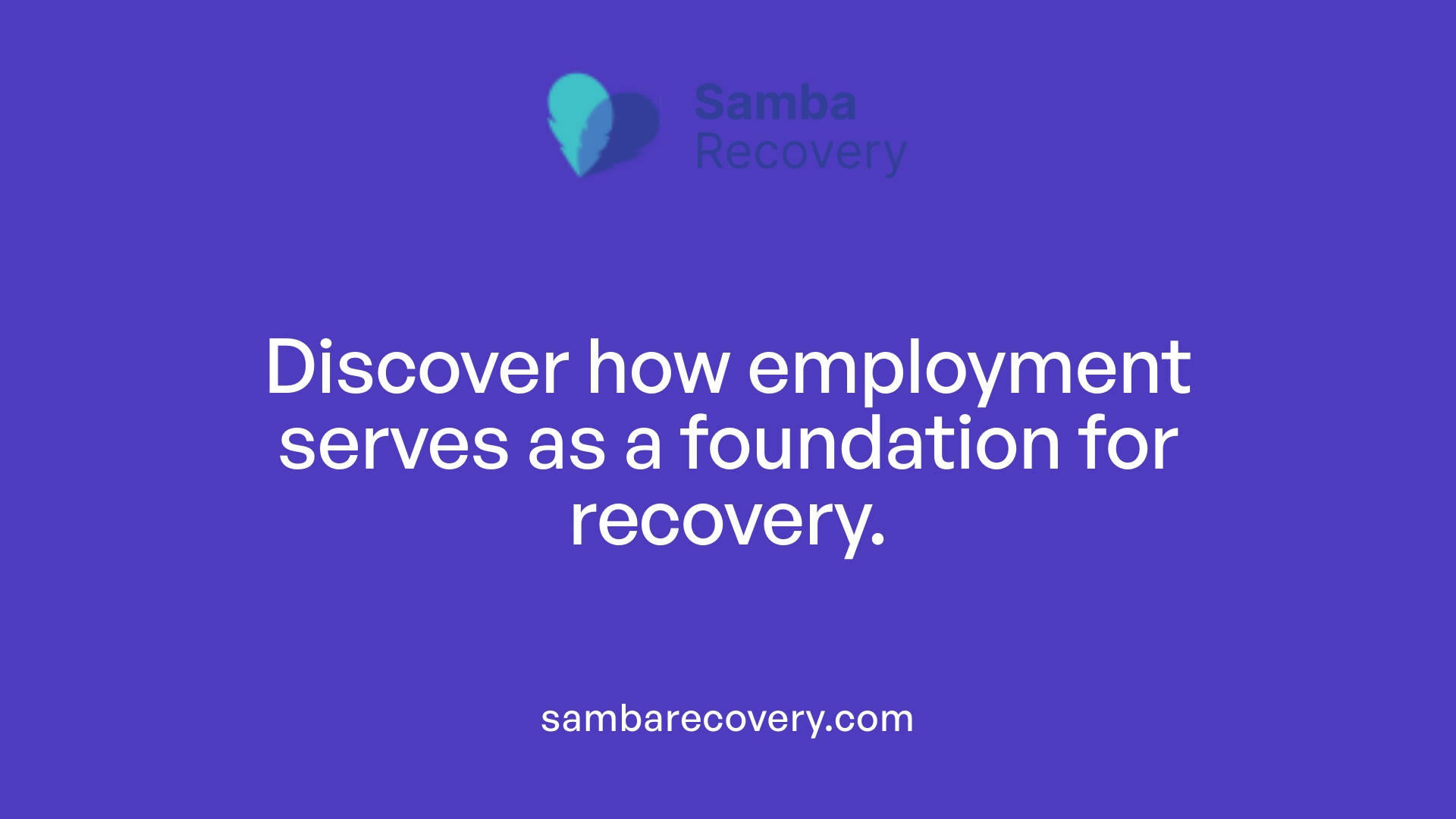
What is the importance of employment in addiction recovery?
Employment plays a crucial role in addiction recovery by providing economic support and enhancing social integration for individuals recovering from substance use disorders.
A steady job not only supplies income but also offers structure and routine, which are vital for maintaining stability during recovery. This routine helps keep individuals occupied and focused, which can reduce triggers that lead to relapse. Additionally, having employment fosters connections with non-substance users, creating a healthier social network and allowing for positive role models in one’s life.
However, many individuals in recovery face significant barriers to employment. These can include low education levels, technical skill deficits, and health comorbidities. A reported 61% of adults with substance use disorders are employed, yet challenges remain that hinder many from finding stable work.
Interventions such as the Therapeutic Workplace aim to address these issues. By linking employment with drug-free requirements, these initiatives promote sustained abstinence. Additionally, targeted workforce development services can effectively improve recovery outcomes, helping individuals overcome barriers and find meaningful employment opportunities.
Benefits of Stable Employment in Recovery
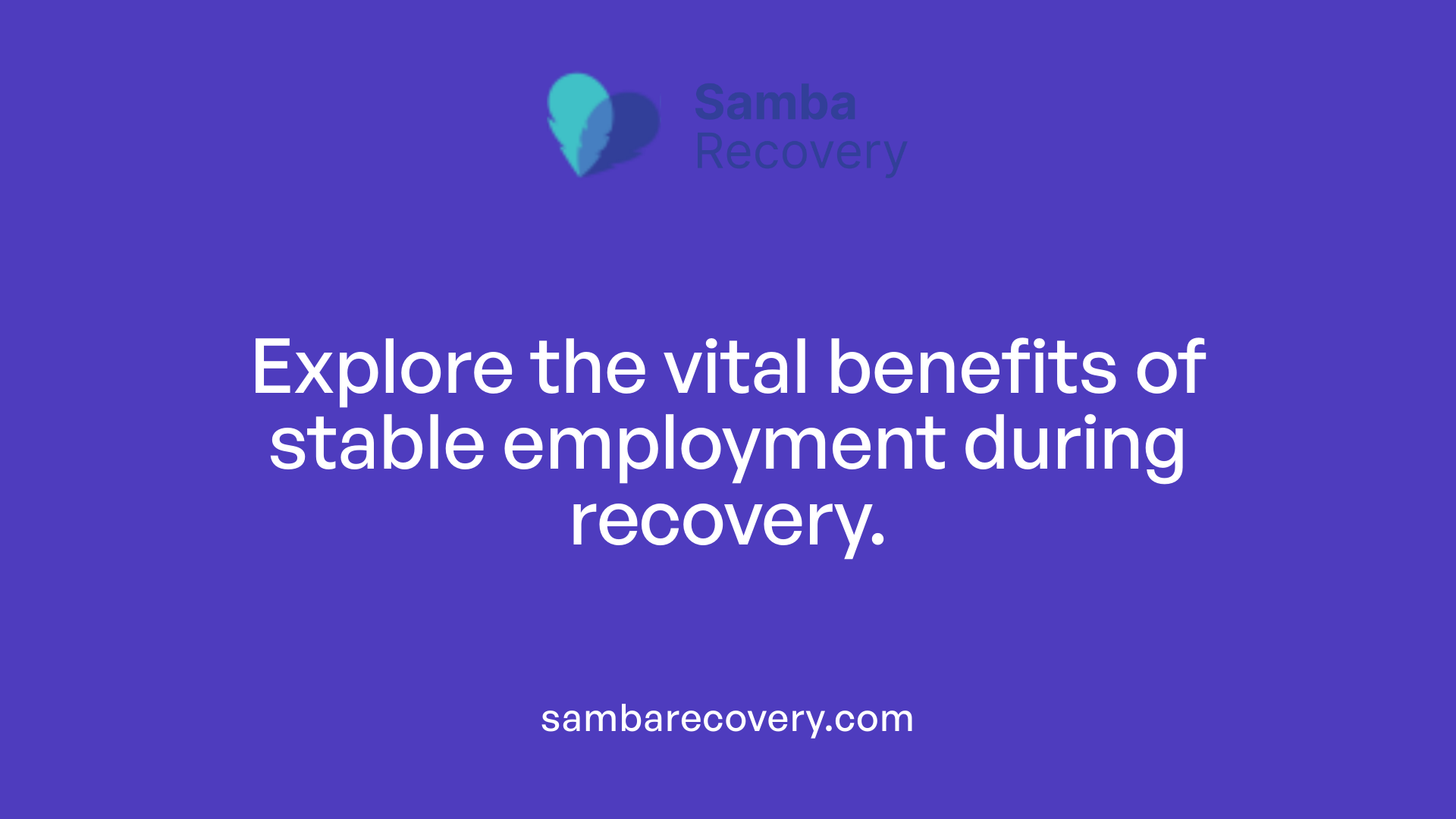
How Does Stable Employment Benefit Individuals During Recovery?
Stable employment plays a vital role in supporting individuals as they navigate their recovery journey from substance use disorders (SUD). By providing financial stability, it enables individuals to manage their expenses, pay off debts incurred during their addiction, and meet day-to-day financial responsibilities. This financial security reduces the socio-economic stresses associated with unemployment, which can otherwise impede recovery efforts.
Financial Stability and Its Impact on Recovery
Having a steady job enhances access to essential resources, creating a more stable living environment that fosters recovery. Routine and structure from work can help individuals stay focused and organized, reducing triggers that could lead to relapse. Moreover, employment training opportunities often teach valuable skills such as financial literacy, which empower individuals to manage their money better post-addiction.
Role of Employment in Preventing Relapse
Stable employment significantly reduces the likelihood of relapse, as individuals with a secure job typically experience lower levels of psychological distress. Employment can also facilitate social connections that enhance support networks, vital for emotional well-being during recovery. Engaging in meaningful work pushes individuals to foster a sense of purpose, ultimately bolstering their commitment to sobriety.
Enhancing Self-Esteem and Self-Efficacy Through Work
Additionally, steady employment boosts self-esteem and self-efficacy. Feeling productive and valued in the workplace reinforces an individualâs identity beyond their addiction, helping them to rebuild their self-image. Cultivating a professional identity further aids personal growth and promotes long-term recovery, ensuring individuals feel empowered and capable of maintaining their sobriety.
Overcoming Employment Barriers After Addiction
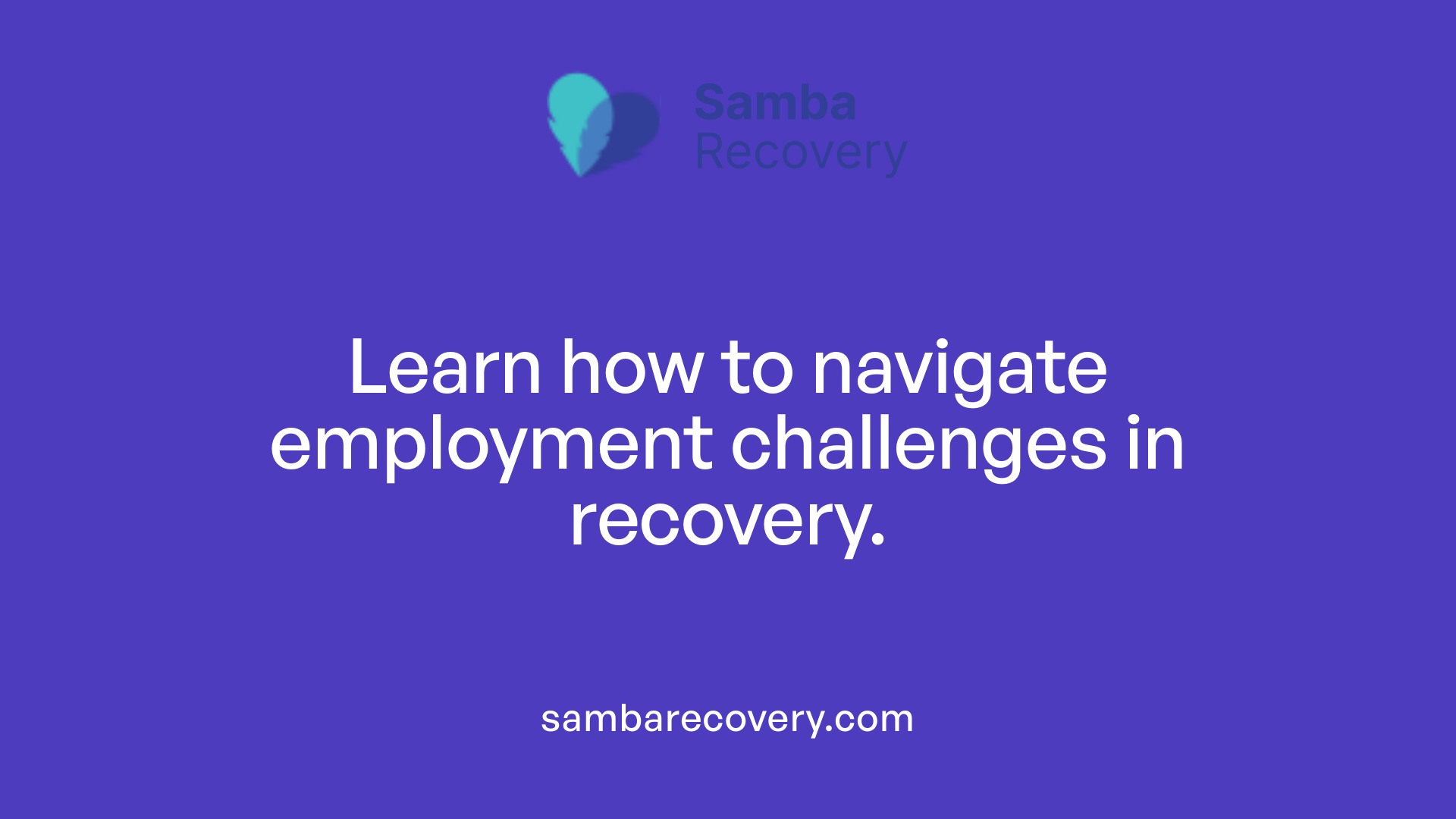
What challenges do individuals face in securing employment after addiction, and how can they be overcome?
Individuals in recovery face numerous challenges in the job market. Stigma around substance use disorders can create a barrier to employment, as potential employers may hesitate to hire those with a history of addiction. Additionally, many recovering individuals contend with gaps in their employment history, lack of confidence, and skills deficits that can further complicate their job search.
To overcome these obstacles, targeted support services are essential. Job placement services focusing on individuals in recovery can facilitate connections with employers who understand the unique challenges faced. Resume development help can highlight the strengths and skills gained during rehabilitation, rather than emphasizing past employment gaps. Practicing interview techniques tailored for individuals in recovery can also build confidence and improve job-seeking skills.
Creating a clear career roadmap is crucial. Individuals in recovery should set achievable goals and communicate their strengths effectively. Furthermore, establishing a robust support network, including peers from recovery programs or alumni groups, can offer encouragement and expand networking opportunities.
Recovery-friendly workplace policies play a significant role in this process. Employers who adopt these policies can actively help reduce stigma and create a nurturing environment for recovery, ultimately promoting long-term job stability and success for individuals re-entering the workforce.
| Challenges Faced | Strategies to Secure Employment | Role of Recovery-Friendly Policies |
|---|---|---|
| Stigma | Targeted job placement services | Reduces stigma in hiring practices |
| Gaps in employment history | Resume development and interview prep | Promotes supportive work culture |
| Lack of confidence | Setting clear career goals | Offers resources for ongoing support |
| Skills deficits | Skills training and workshops | Educates employees about recovery |
Supporting Recovery with Workplace Policies
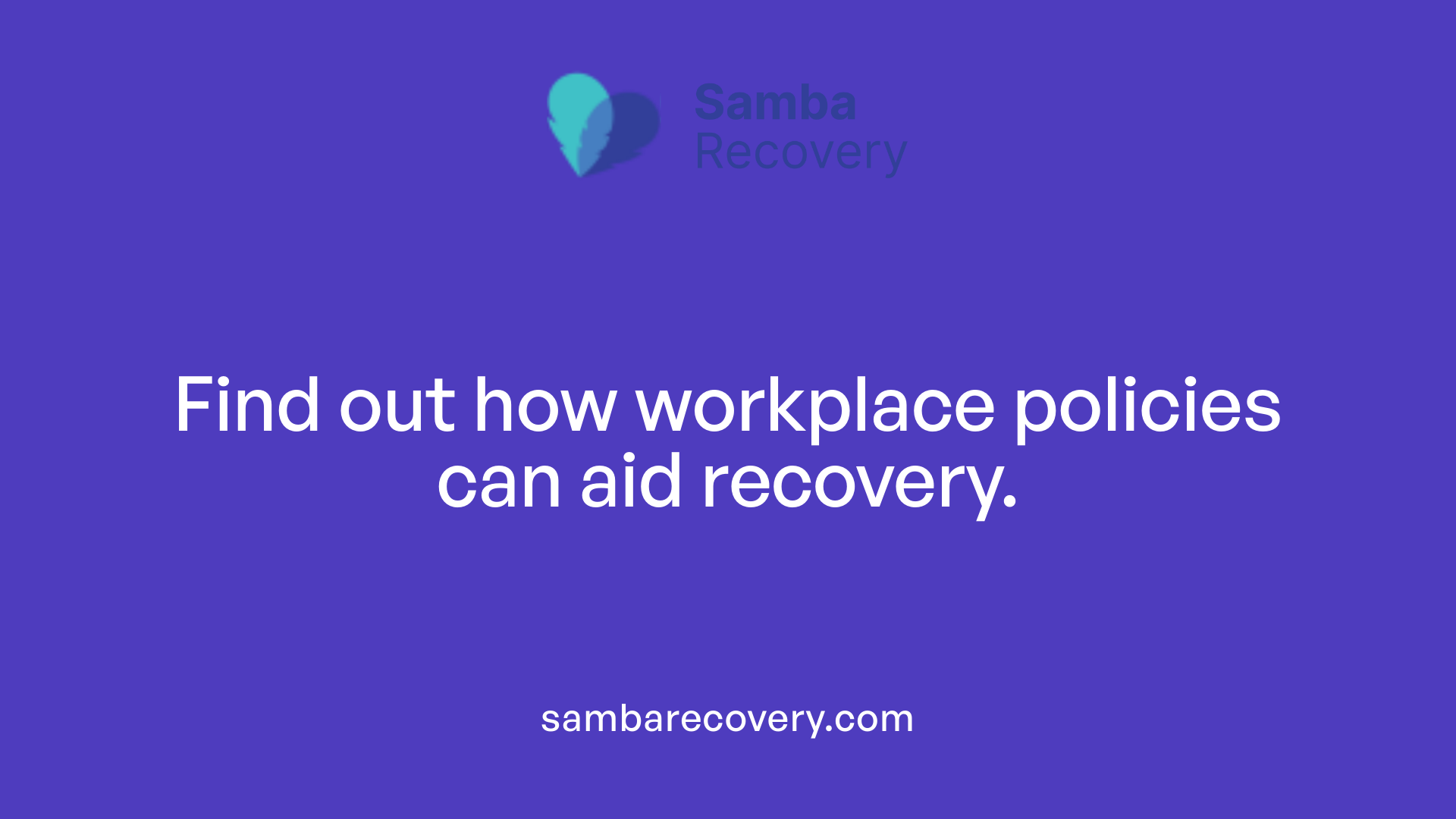
How can workplace policies support recovery?
Workplace policies play a crucial role in supporting individuals recovering from substance use disorders (SUD). By fostering an inclusive environment, employers can create conditions that acknowledge the unique strengths and challenges faced by employees in recovery. This encompasses several initiatives:
- Flexible Scheduling: Providing options for adjusted work hours allows employees to attend therapy appointments without compromising their job responsibilities.
- Employee Assistance Programs (EAPs): These programs can address personal issues, including mental health and substance use, making it easier for employees to seek help when needed.
- Education on Rights: Informing employees about their rights under laws like the Americans with Disabilities Act (ADA) ensures they’re aware of available accommodations that can support their recovery journey.
By facilitating help-seeking behaviors and fostering a stigma-free atmosphere, workplace policies encourage open dialogue about recovery. This supportive culture not only aids individual employees but also enhances organizational health.
Impact on retention and productivity
Adopting a recovery-ready approach can significantly influence retention rates and overall productivity within organizations. Employees in recovery often experience improved self-esteem and job stability, resulting in less absenteeism and lower turnover costs for employers. Research indicates that individuals with a history of substance use disorders tend to report equal or lower healthcare costs compared to those without such histories. This underscores the economic benefits of supporting recovery through proactive policies.
Building a recovery-ready culture
A commitment to developing a recovery-ready culture involves education and training for all staff levels about the realities of SUD and recovery. This includes:
- Reducing Stigma: Workshops and training can help dispel misconceptions surrounding addiction, fostering a more understanding and supportive environment.
- Implementing Structured Policies: Creating clear guidelines for reasonable accommodations and support systems showcases organizational dedication to employee well-being.
Ultimately, these efforts result in a workplace where recovery is not only understood but supported, paving the way for healthier employees and robust business outcomes.
Employment Opportunities: A Catalyst for Recovery and Rehabilitation
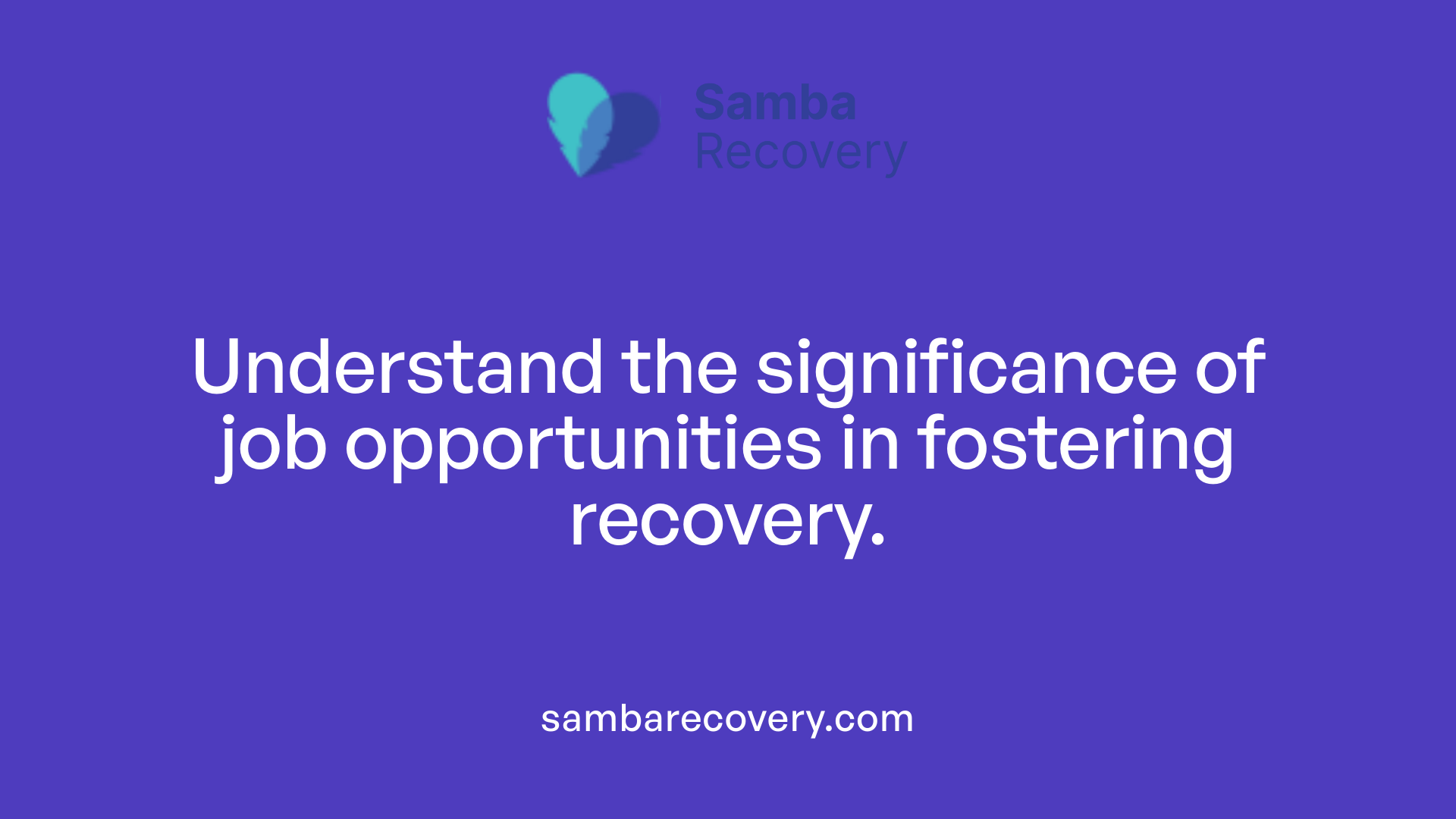
What is the significance of job opportunities in addiction recovery and mental health rehabilitation?
Job opportunities are significant in addiction recovery and mental health rehabilitation as they provide individuals with a sense of purpose, boost self-esteem, and contribute to their overall well-being. Employment helps individuals establish a stable routine and structure, which are critical for maintaining long-term recovery.
Moreover, financial stability from a job reduces relapse rates by enabling individuals to meet their basic needs and minimize triggers associated with substance abuse. Studies show that those who are employed are less likely to relapse compared to their unemployed counterparts. This connection between job security and recovery highlights employment as a fundamental pillar of support in the rehabilitation process.
However, individuals face challenges like stigma, limited support networks, and skill gaps, which can hinder access to employment opportunities. Adequate training and supportive workplace policies, including the Recovery-Ready Workplace initiative, can bridge these gaps, ensuring a more conducive environment for those in recovery.
Overall, fostering job opportunities serves as a powerful tool for promoting recovery and encouraging reintegration into society, significantly contributing to a healthier and more fulfilled life for individuals overcoming substance use disorders.
Employment: A Predictor for Long-term Sobriety and Well-being
What impact does employment have on long-term sobriety and well-being?
Employment plays a crucial role in fostering long-term sobriety and overall well-being for individuals recovering from substance use disorders (SUDs). It provides financial stability, which reduces the stress associated with economic instability and diminishes potential relapse triggers. Furthermore, having a job instills a sense of purpose and creates structured routines that are beneficial in the recovery process.
This connection is reinforced by various studies showing that stable employment correlates with higher self-esteem, improved mental health, and lower rates of relapse. Individuals engaged in meaningful work often report better quality of life and enhanced social interactions, all of which contribute positively to their recovery journey.
Positive workplace conditions and outcomes
Workplace environments that support recovery have been shown to produce significantly better outcomes for employees in recovery. These workplaces adopt policies that help to reduce stigma around addiction, facilitate access to necessary recovery resources, and provide accommodations under laws such as the ADA.
Such conditions lead to increased worker well-being, lower turnover rates, and heightened productivity. Importantly, employees in recovery show equal or lower healthcare costs, absenteeism, and job turnover compared to their peers without a history of SUD. These supportive practices not only benefit employees but also enhance employers’ return on investment.
| Factor | Impact on Recovery | Benefits for Employers |
|---|---|---|
| Supportive Work Culture | Reduces stigma; promotes help-seeking | Higher employee retention; lower turnover costs |
| Reasonable Accommodations | Helps maintain employment | Decreased healthcare costs; increased productivity |
| Recovery-Ready Policies | Fosters understanding and acceptance | Improved company image; enhanced employee satisfaction |
Models promoting employment in recovery
Several intervention models advocate for employment as a cornerstone of recovery. Among these, the Individual Placement and Support (IPS) model emphasizes competitive employment in integrated settings based on individual preferences and strengths. Supported Employment programs provide tailored assistance to help individuals with mental health challenges secure jobs.
These models demonstrate significant improvements in employment and health outcomes. By combining structured job training with ongoing support, individuals can overcome barriers to employment, bolstering their chances for long-term sobriety and self-sufficiency. In summary, the importance of employment in recovery is clear, demonstrating its integral role in fostering resilience, stability, and a renewed sense of identity among those on the path to recovery.
Building Recovery-Ready Workplaces
What are some evidence-based practices for creating recovery-ready workplaces?
Creating recovery-ready workplaces involves several evidence-based practices. Firstly, educating staff about substance use disorders (SUDs) and fostering an understanding of recovery helps to reduce stigma. An inclusive environment can thrive when employees recognize addiction as a treatable health issue.
Implementing recovery-friendly policies, such as second-chance hiring, not only broadens employment opportunities for individuals with SUDs but also promotes a culture of acceptance within the organization. Additionally, providing reasonable accommodations, like flexible work schedules, allows employees to engage with recovery services without compromising their job responsibilities.
Establishing dedicated teams focused on promoting recovery initiatives can significantly enhance the available support for employees. Peer support networks involving individuals in recovery foster a sense of community and provide guidance in navigating the challenges of workplace reintegration.
Comprehensive Workplace Supported Recovery (WSR) programs can facilitate access to necessary treatment and recovery services, creating a safety net that actively prevents substance misuse. Furthermore, hosting events that center around sobriety, along with ongoing educational initiatives, encourages open dialogue about recovery, making it easier for employees to seek assistance when needed.
What are the legal protections and rights for individuals in recovery related to employment?
Individuals in recovery are protected under several laws that ensure their rights in the workplace. Primarily, the Americans with Disabilities Act (ADA) safeguards against discrimination based on previous substance abuse, provided that the individual is not currently engaging in illegal drug use. This law also entitles employees to reasonable accommodations, such as time off for therapy.
The Family and Medical Leave Act (FMLA) further supports these employees by allowing them to take up to 12 weeks of unpaid leave for treatment without the risk of losing their job. In states like California, legal protections are heightened, requiring employers to accommodate individuals entering rehabilitation while maintaining the confidentiality of their treatment details.
Employees have the right to file complaints if their rights are compromised, ensuring protection against discrimination in the workplace. This legal framework is vital in creating an environment where recovery can be pursued without the fear of repercussions.
Conclusion: Unleashing Potential through Employment
Employment is a keystone in the journey of recovery, offering more than just financial support. It lays the foundation for a structured, purposeful life, fostering self-respect and community belonging. As society advances towards more recovery-conscious opportunities, it is crucial for employers to realize the multitude of benefits that employments-centric recovery support provides. Through targeted policies, the promotion of recovery-ready workplaces, and genuine engagement with recovery processes, businesses not only support their employees but also contribute significantly to societal well-being and economic prosperity.
References
- Employment supports recovery: how work helps – DOL Blog
- Finding Purpose: The Value of Employment in Recovery
- The Role of Employment Training in Addiction Recovery
- Recovery-Ready Workplace – U.S. Department of Labor
- [PDF] FACT SHEET The Value and Role of Work During Recovery From …
- The transformative power of job opportunities in addiction recovery
- Supporting Employees into Recovery – National Safety Council






